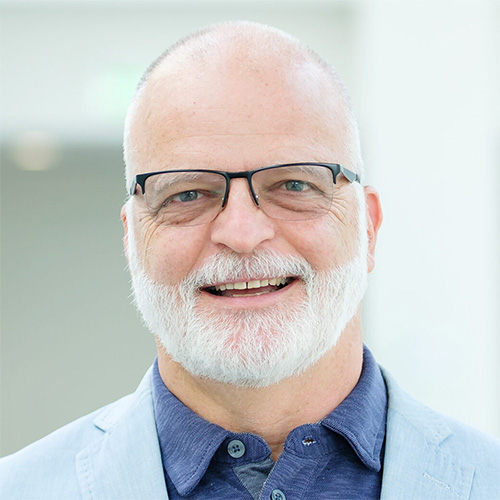David Pace
M.A. in Communication, 1994
 Meet David!
Meet David!
Originally from Provo, I am a writer and editor and a wanderer. For more than two decades I worked as a flight attendant and traveled the world as a “sky gypsy.” I’ve worked as a grant writer, a theater critic, a journalist, a program officer in the arts and humanities, a professional wedding officiant, a lifeguard and an adjunct professor. I am currently a fiction writer by avocation with two books of fiction under my belt and a third in the works. By profession I am the full-time science writer and editor at the U’s College of Science.
Q: What led you to choose the University of Utah, and what drew you to study Communication?
A: I was living and working in Salt Lake City at the time and the U was convenient. I initially applied to the creative writing program but was not selected. It occurred to me at the time, that I really wanted to pursue graduate work as an extension of my undergraduate English degree and quickly pivoted to communication where I focused on rhetoric and culture studies. This allowed me to pursue my interest in examining (and writing, and endlessly re-writing) texts.
Q: What was your first job out of college?
A: I was hired as a flight attendant following my BA in English with University Honors at another institution. I continued working as a flight attendant through graduate school and beyond.
Q: What impact has your education from the College of Humanities had on your life?
A: Having an advanced degree (MA) made me more competitive as I applied for work within the airline industry and later, after my departure, in other work that primarily spanned non-profit development (fundraising) and management. “Communication” is a tabula rasa for many; people project onto that blank canvas whatever they imagine “communication” means. It was both a blessing and a curse in seeking and securing work. It was my job to re-interpret the term in the context of the job and experience I was looking to pursue.
Q: What advice would you give to current humanities students?
A: You’re here to pick up skills—writing, reading, analysis, and creative association of disparate life artifacts. But you’re also here to learn to analyze, to think critically and to work the skill of associative thinking to creative, strategic and pragmatic ends. Those ends may be in organizations, interpersonal relationships, social justice pursuits or some other area. You’re also here to learn to be a translator of specialty knowledge for the public: to illuminate, inspire, and propel change and growth in people’s personal lives and in larger sectors and institutions. You’re also here to edify others in a general way for purposes not only of education and training but for sheer delight and to give others and yourself permission to lean into the wonder and work of being human.
Q: What advice would you give to graduating students as they start to explore a career and life after college?
A: Learn to sell yourself and to sell the humanities as an enterprise critical to society. You are an evangelist for the humanities and for yourself: a double effort that others—for example those in STEM or business, or healthcare or social sciences—don’t have to engage in. You do. Put your running shoes on and plan on a long, sometimes tortuous, but ultimately exhilarating journey. You will find that humanities informs, underscores, validates and enables everything you do and everything that others do—even if others, especially state legislators and hard-core, late-stage capitalists, don’t know it.
Q: What is the best professional advice you’ve ever received?
A: Trust the process, not only of job/career, but of life. Life and its subset of career/work is, by definition, circuitous, wandering, and unexpected. Accept that and always be looking for opportunities to be your best self.
